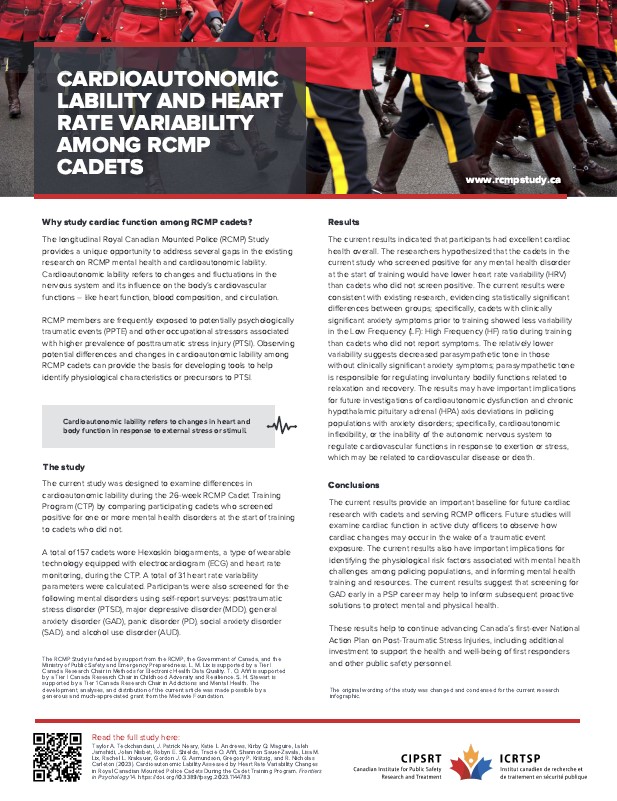Research Summaries
Why was the study done?
The current study was designed to examine differences in cardioautonomic lability during the 26-week Royal Canadian Mounted Police (RCMP) Cadet Training Program (CTP), by comparing participating cadets who did and did not screen positive for one or more mental health disorders at the start of training. Cardioautonomic lability refers to changes and fluctuations in the nervous system, and how nervous system changes influence cardiovascular functions, such as heart function and blood circulation.
The current study was also designed to provide baseline measures of cardioautonomic lability for future analyses as we monitor RCMP cadets over the course of their careers. Observing potential differences and changes in cardioautonomic lability among RCMP cadets can assist in developing tools to identify physiological characteristics or precursors to posttraumatic stress injuries (PTSIs).
What was done in the study?
The current research is part of a larger RCMP Study designed to 1) develop, deploy, and assess the impact of a system for ongoing annual, monthly, and daily evidence-based assessments; and 2) enhance the RCMP CTP with evidence-based skills to help reduce the frequency or severity of PTSI symptoms. A research summary of the previously published Study Protocol can be read here.
Some (n = 156; 79% male) of the RCMP Study cadet participants were provided Hexoskin biogarments to wear during training. Hexoskin biogarments are wearable technology that recorded electrocardiogram (ECG) and heart rate for participants during the 26-week CTP. the recordings allowed 31 heart rate variability parameters to be calculated. Participants starting the CTP were screened for the following mental disorders using self-report measures: posttraumatic stress disorder (PTSD), major depressive disorder (MDD), general anxiety disorder (GAD), panic disorder (PD), social anxiety disorder (SAD), and alcohol use disorder (AUD). The data from participants who screened positive for one or more mental disorders when starting the CTP were compared with the data from participants who did not screen positive.
What did we find out?
Researchers expected that RCMP cadets who screened positive for any mental health disorder at the start of training would have lower heart rate variability than cadets who did not screen positive. The current results indicated study participants had excellent cardiac health overall and suggested potentially important differences between groups, such that cadets who reported clinically significant anxiety symptoms showed less heart rate variability along the Low Frequency (LF) to High Frequency (HF) ratio. The relatively lower heart rate variability suggests decreased parasympathetic tone in those without anxiety symptoms; parasympathetic tone is responsible for regulating involuntary bodily functions related to relaxation and recovery – such as heart rate and steady breath.
The current results may have important implications for future research on cardioautonomic dysfunction and chronic hypothalamic pituitary adrenal (HPA) axis deviations among police with anxiety disorders; specifically, cardioautonomic inflexibility, or, the inability of the autonomic nervous system to regulate cardiovascular functions in response to exertion or stress, which may be related to cardiovascular disease or death.
Where do we go from here?
The role of stress and anxiety on HPA axis deviations as evaluated by heart rate variability has been extensively studied, producing mixed results. The current study was designed to examine differences in cardiac function among cadets who screened positive for one or more mental health disorders prior to training and those who did not. The results support the current literature, evidencing statistically significant differences between groups, and suggesting that cadets with clinically significant anxiety symptoms prior to training show less heart rate variability in a key measure (High frequency: Low frequency) during the 26-week training program than cadets who did not.
The current results provide an important baseline for future cardiac research with cadets and serving officers. Future studies will examine cardiac parameters in active duty officers to observe how cardiac changes may occur after exposures to potentially psychologically traumatic events.
The results help to continue advancing Canada’s first-ever National Action Plan on Post-Traumatic Stress Injuries, including additional investment to support the health and well-being of first responders and other public safety personnel.
The original wording of the study was changed and condensed for the current research summary.
The RCMP Study is funded by support from the RCMP, the Government of Canada, and the Ministry of Public Safety and Emergency Preparedness. L. M. Lix is supported by a Tier I Canada Research Chair in Methods for Electronic Health Data Quality. T. O. Afifi is supported by a Tier I Canada Research Chair in Childhood Adversity and Resilience. S. H. Stewart is supported by a Tier 1 Canada Research Chair in Addictions and Mental Health. The development, analyses, and distribution of the current article was made possible by a generous and much-appreciated grant from the Medavie Foundation.
Original Study
Taylor A. Teckchandani, J. Patrick Neary, Katie L. Andrews, Kirby Q. Maguire, Laleh Jamshidi, Jolan Nisbet, Robyn E. Shields, Tracie O. Afifi, Shannon Sauer-Zavala, Lisa M. Lix, Rachel L. Krakauer, Gordon J. G. Asmundson, Gregory P. Krätzig, and R. Nicholas Carleton (2023). Cardioautonomic Lability Assessed by Heart Rate Variability Changes in Royal Canadian Mounted Police Cadets During the Cadet Training Program. Frontiers in Psychology 14. https://doi.org/10.3389/fpsyg.2023.1144783
Prepared by T. Teckchandani
